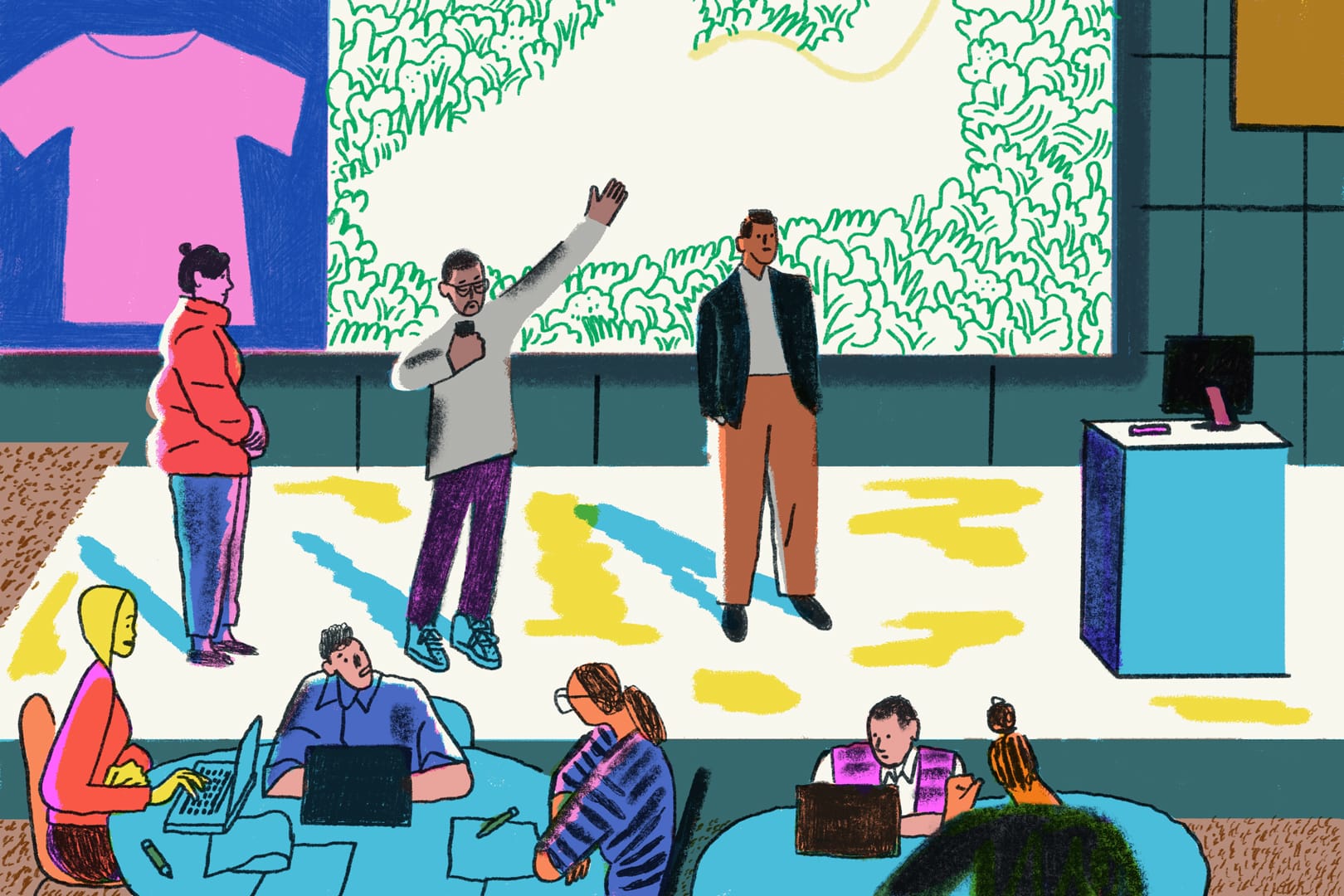“It was like unicorns coming together to make what I call a Voltron unicorn,” says Allbirds CFO Jeneen Minter, explaining the secret sauce that powers the eco-friendly shoemaker with a comparison to the ’80s cartoon superrobot. She’s standing in Ambani Auditorium, describing the synergy between co-founders Tim Brown and Joey Zwillinger WG10, the latter of whom spent plenty of time here in Huntsman Hall not long ago. It’s been a meteoric rise for the company, growing from humble startup in 2015 to a billion-dollar valuation in just three years. (Read more about Zwillinger’s journey here.)
But Minter’s not on campus for a nostalgia trip or promo tour. She’s looking for a new Voltron-style upgrade for Allbirds via a hackathon of 36 teams of Wharton freshmen and sophomores who are competing to pitch their visions for the shoe company’s next big thing. This is the third installment of Huntsman Hacks, a business case-study simulation for undergraduates. Over the course of nine hours on a Saturday in February, teams of four and five students will conceive new product lines, develop cash-over-valuation projections, and audition their ideas in front of Allbirds reps, including Minter, with cash prizes on the line. Think Model United Nations meets Shark Tank.
The event, organized by the Wharton Dean’s Undergraduate Advisory Board, grew out of efforts to combat the sophomore slump. Huntsman Hacks soon “evolved into a larger effort to engage first- and second-year students to develop core business skills in a collaborative way outside of the classroom,” says this year’s organizer and advisory board member, Carisa Shah ENG22 W22. Before the hackathon, it was hard for younger Wharton undergrads to find case-study-type programming geared specifically toward them — events where they’d feel comfortable enough to spread their wings away from more corporate-ready juniors and seniors. The first hack took place in 2017, sponsored by Alibaba, and the program returned last year in partnership with Vox Media and its CEO, Jim Bankoff WG96. Participation is up nearly 25 percent over last year. “We’ve always had great companies with really unique perspectives,” says Miyu Ono ENG21 W21, another member of WAB and the lead organizer for Huntsman Hacks in 2019. “The excitement is even bigger with Allbirds.”
The competitors are hungry to start the day, and not only because the hack kicks off at 8:30 on Saturday morning. “I know this is earlier than a lot of you have gotten up since high school,” Shah tells the 163 early risers who’ve filled the auditorium. Minter follows with a presentation that gets sleepy synapses firing, covering everything from Allbirds’ meteoric rise to Maslow’s hierarchy to retail theory circa 200 B.C. Then the teams head off to their first breakout session and are given a prompt (create a new product line) that they’ll refine and reimagine throughout the day. Over the course of three rounds, they’ll deliver revenue projections, marketing plans, and pitch decks — all while a team of judges comprised of current MBAs and a half dozen Allbirds employees sits in another room, grading ideas ranging from wool wallets to pocket squares to sandals made of coffee grounds.
“This is basically consulting,” says judge Daniel Nelson WG21, a former senior digital analyst for McKinsey. “A lot of it is intuition. It’s a way of thinking. That’s why kids are doing stuff like this — so they can think through these business challenges and what makes the most sense.” Nelson was drawn to the event for two reasons. First, he’s been blown away by the intellect of undergrads he’s observed in some of his own classes. Second, he’s starting a therapeutic shoe-sole insert company with a classmate he met during MBA Welcome Weekend, so he’s got his own Voltron power-up incentives.
The judges hold “office hours” throughout the day. Once teams get going, they’re allowed realtime feedback prior to the judges’ official scorecard, which rates elements including feasibility, innovativeness, and creativity. Bonus points go to ideas that embody the three-point ethos of Allbirds: Live curiously, simplify naturally, act intentionally. For the company, which has announced plans to open a brick-and-mortar store in Philly, it’s quality market research and smart brand deployment. “Allbirds shoes are part of the dress code on campus now,” says Alex Berger W22, one of the WAB organizers. “To hear from your customer base and pull their ideas is valuable.” Participants snag cool swag bags, that all-important catered lunch, and an experience that goes beyond playing businessperson for the day — these underclassmen get to know what it’s like to work at a startup, both in the practice of the simulation and in absorbing what is taught to them.
During a new hackathon feature, students catch their breath as management professor David Hsu holds a midday fireside chat with the Allbirds judges. “When I think of corporations, there’s little room for mistakes,” says global product strategist Mariam Amirkhanashvili. “Being at a small company, it feels more comfortable and okay making those types of mistakes, because everyone does it.”
The competition resumes with a showdown of pitches from the five final teams, with concepts including the coffee-grounds sandals (“Brewtifully Crafted”), an underwear line, throw pillows, and a sleepwear collection. But the winner is an athleisure brand with a sporty tagline — “Fly, so you can soar” — and a pristine pitch detailing how the product could reach a cool $140 million in revenue in just a few years. To the victors go the spoils: $1,000, plus VIP tickets to the opening of the local Allbirds shop.
The success of Huntsman Hacks is reflected in the positive feedback of the judges, who — perhaps even more than the students — can see just how closely this simulation resembles real life inside a startup. The underclassmen use actual Allbirds data about distribution lines and revenue streams, then find more info online to craft the most accurate and plausible pitches for their own products. Will Liu from the Allbirds finance team is impressed. “[Comparing] a big corporation to a startup like Allbirds, we’re not going to have all of those resources available,” he says during the fireside chat, connecting his experience at the company to what the students accomplish here. “You have to be very creative … like what a lot of you guys saw today.”
Malcolm Burnley is a correspondent for the Fuller Project and a freelance writer living in Philadelphia.
Published as “Hack to the Future” in the Spring/Summer 2020 issue of Wharton Magazine.
























